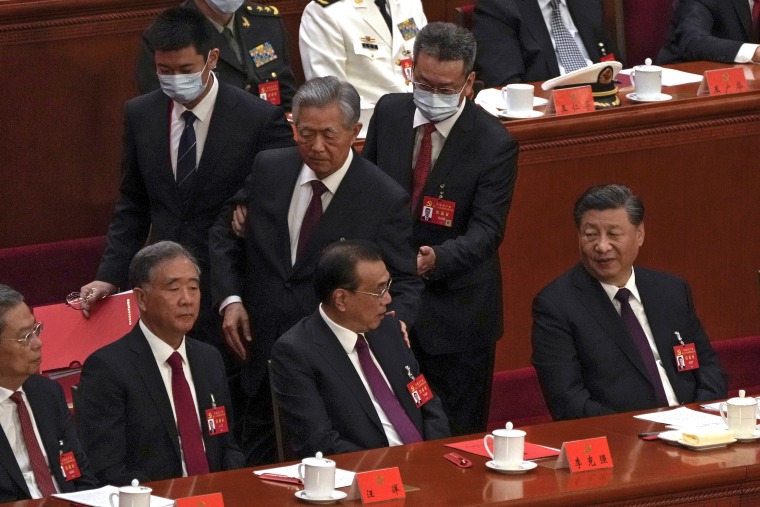BEIJING — Former Chinese President Hu Jintao was led out of the country's Communist Party Congress Saturday in a moment of unexpected drama during an otherwise highly choreographed event.
Hu, 79, was sitting beside President Xi Jinping in Beijing’s Great Hall of the People when he was approached by a man in a suit and surgical mask who spoke to him and appeared to pull his right arm.
With Xi looking on, the man then placed both hands under Hu's armpits and attempted to lift him out of his seat. Xi appeared to talk to his predecessor before the man got between them and tried to lift Hu again.
Another man in a mask arrived, and Hu eventually stood up, after it appeared as if he was trying to get back to his seat. He exchanged a few words with Xi and placed a hand on the shoulder of Premier Li Keqiang, the nation’s number two official, before he was escorted away.
Just before the incident, Hu had been speaking with Li Zhanshu, the chairman of the standing committee of the National People's Congress, the top leadership team in China.
Li had his chair turned toward the former president to talk. As Hu was led away by the men, Li attempted to stand up but was pulled back down by Wang Huning, another party leader.
No explanation was given for the incident, which lasted several minutes and took place shortly after international media were let into the hall to report on the twice-a-decade event at which new promotions and appointments are announced and political strategy is decided for the next five-year cycle.
It came after the party approved amendments to its constitution aimed at cementing the core status of Xi and the guiding role of his political thought within the party, which has about 96 million members.
Among the amendments, the “Two Establishes” defines Xi as the “core” leader of the party, and his ideas as the guiding principles of China’s future development. The “Two Safeguards” assures Xi’s “core” status within the party and the party’s centralized authority over China.
The central committee will announce the new Politburo Sunday, which typically consists of 25 people. A new standing committee, the top leadership team of the party, will also be announced.
Premier Li Keqiang, a strong proponent of economic reforms, was among four of the seven members of the nation’s all-powerful Politburo Standing Committee, who, in a leadership reshuffle Sunday, will not be reappointed.
It is widely expected that Xi Jinping will hold on to his status as general secretary and head of China’s armed forces.
Given the cementing of his status as a core leader, he could also be named party chairman, a title previously bestowed only on Mao Zedong, who ruled the People’s Republic of China for 27 years after its founding in 1949.
His third title, president, is not up for renewal until spring.
Xi’s power appears undiminished by the events of a tumultuous year, including a sharp economic slowdown, frustration over his zero-Covid policy and China’s increasing estrangement from the West, exacerbated by economic competition, tensions over the Taiwan strait and differences over Russia’s war in Ukraine.
However, Xi's long-term political future was not guaranteed, Andreas Fulda, a political scientist at Nottingham University in the U.K., told NBC News Saturday.
“When there are setbacks or failures of government, people will blame the man,” he said, adding that under previous presidents, power was dispersed more collectively across different ministries rather than through the central party.
“With Xi Jinping being so prominent, and the party so omnipresent, whenever something goes wrong in China the party will be blamed, and Xi Jinping will be blamed,” he said.
In his closing remarks, President Xi said that the Chinese Communist Party, now in its 100th year, was still in its prime.
“The Communist Party of China is once again embarking on a new journey on which it will face new tests,” he added, as reported by The Associated Press.
The congress concluded by playing the socialist anthem, “The Internationale.”
Janis Mackey Frayer reported from Beijing and Leila Sackur from London.

